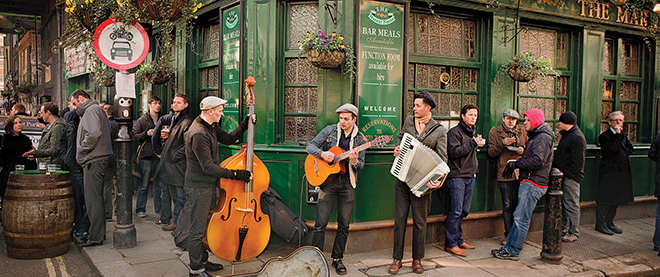God save the pint
With thousands of historic English pubs dying, architects are taking up the cause
Bruno Ehrs/Corbis
Share

The Wenlock Arms, established in 1835, is one of London’s most cherished pubs. It has a ramshackle charm, with a bountiful selection of cask ales, traditional jazz and blues artists playing in the evenings, a delightfully odd weekly quiz and a clientele that includes locals and their dogs, artists, aging hippies and pilgrims from around the world who’ve navigated east London’s dark back streets to find it. Recently, part of Simon Pegg’s upcoming apocalyptic pub-crawl comedy, The World’s End, was filmed there.
The Wenlock survived the Blitz, but in 2011 it was acquired by a developer and its future looked precarious. Earlier this year, after various rounds of proposed changes, around 100 of its patrons gathered at Hackney Town Hall to oppose an application to build an extra storey for apartments. They argued that extensive rebuilding, wiping out a function room used for everything from birthday parties to tai chi classes, would irredeemably alter the pub’s character. They lost. The Wenlock closed this week for renovation.
It could have been worse. With London’s astronomical land values, many a thriving independent pub is being converted into a chain store or demolished in favour of flats. In fact, the Wenlock’s developer originally threatened to do the latter, before a flood of objections helped thwart its plan. Grassroots campaigns only do so much; Gordon Joly, of the 600-odd-member “Save the Wenlock” Facebook group, laments, “A developer is a machine.” Even as London has promoted itself to the world via the Olympics, the royal wedding, and the Queen’s Jubilee, an important part of its heritage has been under threat.
“There were 20,000 pubs in London at the end of the 1970s and there are now something like 1,500,” says architect Daniel Rosbottom, over a pint at the Lamb, a historic Bloomsbury pub. “It’s been a huge decline for an incredibly concentrated cultural force.”
Rosbottom and designer David Knight, who both teach architecture at Kingston University, sent 410 students around the city last fall to research pubs. Later this year they plan to apply for protection for London pubs through UNESCO’s Convention for the Safeguarding of Intangible Cultural Heritage. The idea isn’t to protect specific pubs, but the pub as a type—in the same way Austria’s UNESCO commission protects the Viennese coffehouse as, in the organization’s words, “a place ‘where time and space are consumed, but only the coffee is found on the bill.’ ”
Pubs, Rosbottom notes, are “public spaces that are commercially funded,” and this in-between status often leads both bottom-line-oriented owners and civic-minded preservationists to shrug off their importance. Beer writer Pete Brown has witnessed that indifference. In May, his book Shakespeare’s Local, about the George, a 600-year-old coaching inn, will be published in Canada; he says the National Trust, which now owns the pub, wouldn’t help him in his research. “It’s just like, ‘I’m trying to write a book about one of your properties that will make it more famous and bring people in.’ They couldn’t care less.”
Some would argue pubs’ owners should be able to do what they want with their buildings. Knight says, “London is always this tumultuous, opportunistic, commercial nightmare in its development. I don’t want to sound nostalgic about a place that doesn’t do nostalgia.” And yet, “a pub is something you create over decades; it has a constituency. It has whole networks it builds up over time.”
UNESCO’s focus on the “intangible” may help, but Rosbottom and Knight’s application must answer a number of questions: which pubs should be protected and how? Might restrictions make pubs less desirable as businesses? Just what makes up a pub anyway?
For Knight, this last issue is crucial. “There isn’t a system to say, ‘That function room is important. The fact that there isn’t a young family living upstairs is important.’ The Wenlock is a pub that hundreds and hundreds of people think is one of the best in the world; why are we chucking it away? In a country that claims to have an incredibly sophisticated attitude to heritage, we should be able to protect these things.”
Editor’s note: The British Beer & Pub Association estimates there are approximately 5000 pubs in London, rather than 1,500.